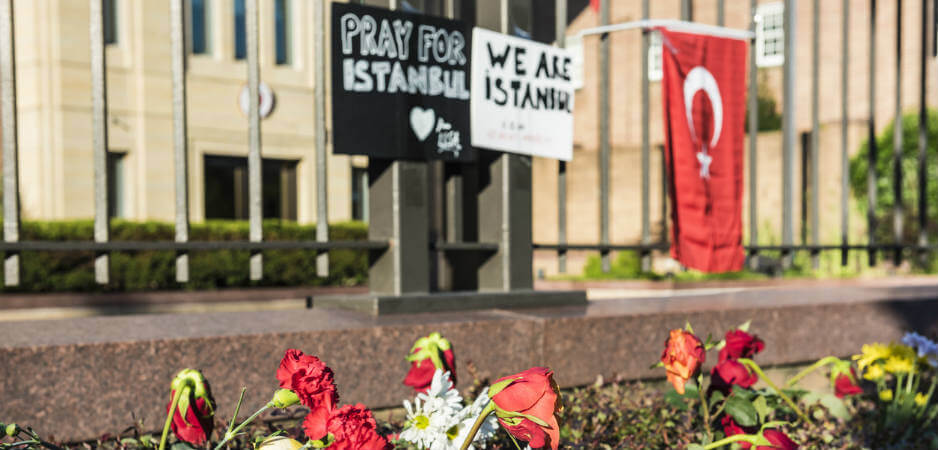An economic model where share prices of McDonald’s soar and mom-and-pop restaurants close may be efficient and convenient, but might not be equitable or soulful.
This week, The Economist reported that stock markets had a good 2016. During the year, the S&P 500 rose by 11.1% and the Dow Jones by 14.4%. Despite Brexit worries, the FTSE 100 increased by 15.2%. Russia’s RTS index ended 28.9% higher, a whopping 55.4% rise in dollar terms. Despite political turmoil and impeachment of the president, Brazil’s Bovespa was up by 39%. Islamist violence did not stop Pakistan’s main index growing by 48.4%. Crisis prone Argentina’s index shot up by 55.4%, which was an impressive 24.9% rise even in dollar terms.
Of course, it was not party time everywhere. Italy’s main index fell by 8.4% and China’s Shanghai Composite decreased by 10.7%. Yet on the whole stock markets had a good 12 months.
Does this mean the global economy is going swimmingly well and we can all sing “Kumbaya”?
BANANA PEELS FOR THE GLOBAL ECONOMY
Only people who own a ton of shares equate stock markets with the real economy. Publicly-listed companies comprise a tiny fraction of the numerous businesses that comprise any economy. Even as stock markets have done well, the World Bank estimated that global growth had slowed to 2.3%, the lowest since the global financial crisis of 2007-08. It attributed the slowing of growth to stagnant global trade, subdued investment and heightened policy uncertainty.
The International Monetary Fund, the sister institution of the World Bank, estimated global growth at a lackluster 3.1%. It attributed this to lower investment and falling productivity as well as the slowdown in global trade. Furthermore, the IMF saw dark clouds on the horizon. As per the IMF, loose monetary policy is likely to continue and interest rates are likely to remain low. Falling commodity prices have put many emerging economies like Brazil and South Africa in a tough spot. The IMF foresees a subdued outlook for advanced economies as well.
The IMF sees both Brexit and the election of Donald Trump as banana peels for the global economy. China might be an even bigger banana peel with its slowing growth and mounting bad debts on the books of its banks. Sentiments against globalization are on the rise. Should protectionism wax, trade would wane. Besides, political uncertainty would drive down both investment and consumption. John Maynard Keynes’ “animal spirits” could hit a downward spiral. Of course, Trump offers prospects of a fiscal stimulus, especially in infrastructure. This could boost global growth above expectations. As of now, the IMF estimates global growth for 2017 at 3.4%.
Even the chief economist at Goldman Sachs, Jan Hatzius, expects 3-3.5% growth in 2017. While Hatzius expects the US to grow more strongly, he foresees Europe experiencing more of the same. Much of the continent is in a dire debt crisis with high unemployment and sclerotic growth. This will continue. Hatzius is cheerier about Africa and Latin America. He expects a whiff of fresh air to take them out of the doldrums. As per the Goldman guru, China will continue to grow and India will grow even faster. Yet stocks have surged since Trump became president-elect. Companies expect Trump will stimulate the economy with tax cuts, increased infrastructure spending and less regulation for the financial industry. Yet not is all rosy for investors as well. Reuters reports that investors “worry that Trump’s measures could stir inflation and push the U.S. central bank to raise rates more aggressively than anticipated.”
IS THIS THE ERA OF SECULAR STAGNATION?
In early October 2016, the IMF warned about debt surging to 225% of the global GDP. Eight years after the worldwide financial crisis, debt levels had shot up more than ever. The IMF estimated the figure to be $152 trillion, including debt held by governments, non-financial firms and households. Apparently, two-thirds of this debt has been taken on by the private sector. According to Vitor Gaspar, the fiscal big boss at the IMF, “Excessive private debt is a major headwind against the global recovery and a risk to financial stability.”
Slow global growth is compounding debt burdens. During periods of high growth, incomes and taxes rise. This allows people and governments to pay off their debt. When growth is slow, so are incomes. Deleveraging, the term for lowering or getting rid of debt, becomes difficult. In practical terms, it is difficult for any family to meet its mortgage payments when pay is tight. Sometimes, people have to take on even more debt during hard times, pushing them into a vicious cycle. This can happen to countries as well à la Greece.
One way to pay the debt when growth is slow and incomes are low is to sell assets. This may not work when those with debt do not have many assets. Students are a classic case in point. In the US, many graduate from college or law school with quite a bit of debt. However, they find jobs hard to find when growth is slow. Jobs that pay decently are even harder during such times. If people have assets that might always help. If too many people sell at the same time, supply increases and prices fall. In economic crises, even prized assets are often sold at fire sale prices.
Given current debt levels, the global economy faces a significant risk of vicious cycle of low growth and deleveraging. For companies in export-oriented countries like South Korea, this involves firing workers, closing plants, slashing research and development budgets and, of course, selling off assets. For South Korean households, this involves tightening their belts, buying less and even selling assets to make ends meet. In such a situation, confidence ebbs, investment drops and growth slows.
South Korea is not alone in facing the music of a slowdown in global trade. For more than two decades, global trade had explosive growth. The November 20, 2016, edition of The World This Week examined how world trade had hit headwinds. As per the World Trade Organization, trade had a three-decade fiesta. From 1980 to 2011, merchandise exports rose from $2 trillion to $18.2 trillion and commercial services trade from $367 billion to 4.2 trillion. Growth rates of 7.3% and 8.2% respectively for both types of trade exceeded the rate of growth of the global economy.
On December 9, 2016, Roberto Azevêdo, the director general of the WTO, remarked that the 1.7% growth in global trade for the year marks “the slowest pace of trade growth since the financial crisis.” He blamed the “lackluster performance of the global economy” for the slowdown. At the same time, Azevêdo admitted that “182 new trade-restrictive measures, excluding trade remedy measures, were put in place” during the year, “an average of just over 15 new measures per month.” The WTO chief warned that these trade restrictive measures “can have a further chilling effect on trade flows, with knock-on effects for economic growth and job creation.”
It is not just Azevêdo who is fretting about the vicious cycle of lower growth and fewer jobs. Even the ebullient Larry Summers, the Clintonite who was one of the founding fathers of the new global economy in the post-Soviet era, has turned somber. A paper he co-authored predicted secular stagnation for much of the global economy. Secular in economics has nothing to do with religion. It means something that is not cyclical or short term but structural and long term. In simple English, it means the global economy might be headed for a period of low growth, no growth, recession or even depression for the foreseeable future.
With his comrades, Summers makes the case that “capital flows transmit recessions in a world with low interest rates and that policies that trigger current account surpluses are beggar-thy-neighbor.” Their paper seems to imply such policies are a modern form of mercantilism when each country tried to export more than it imported to run surpluses.
There is an element of truth to this argument. When one country follows a loose monetary policy by lowering interest rates or unleashing quantitative easing — i.e. de facto printing currency — its goods and services become cheaper. If each country embarks on such a policy, then you get a beggar-thy-neighbor policy that the Summers’ paper warns against. Others have warned against this phenomenon before.
 On September 27, 2010, Guido Mantega, the then-Brazilian finance minister, claimed that an “international currency war” had broken out as governments competed to devalue their currencies to make their exports competitive. On November 8, 2010, Wolfgang Schäuble, Mantega’s German counterpart, blamed the US for artificially depressing “the dollar exchange rate by printing money.”
On September 27, 2010, Guido Mantega, the then-Brazilian finance minister, claimed that an “international currency war” had broken out as governments competed to devalue their currencies to make their exports competitive. On November 8, 2010, Wolfgang Schäuble, Mantega’s German counterpart, blamed the US for artificially depressing “the dollar exchange rate by printing money.”
Not much has changed since Mantega and Schäuble aired their views. In 2015, the Zen masters at McKinsey Global Institute observed that, since 2007, “global debt had grown by $57 trillion and no major economy had decreased its debt-to-GDP ratio.” In advanced countries, government and household debt had increased. In China, debt had quadrupled in eight years, “fueled by real estate and shadow banking.” More worryingly, increasing debt has left incomes trailing.
STOCK MARKETS ≠ REAL ECONOMY
The January 24, 2016, edition of The World This Week argued that the global economy was experiencing both a demand and a supply problem. The current economic model is broken. In the US, globalization and automation have decimated jobs. Serving as baristas in Starbucks does not pay that much and high rents cost a packet. Americans who are struggling to pay off their mortgages, car loans, and student and credit card debts can no longer shop at Walmart as they once used to. So, Chinese factories can no longer operate full steam to send irons, ironing boards, electric kettles, iPhones or other trinkets for American households.
Besides, quantitative easing has failed to stimulate animal spirits. It has only boosted prices of assets such as houses and shares. On November 29, 2016, The Wall Street Journal reported that US home prices crossed their July 2006 peak. Similarly, stock markets have been doing swimmingly well. This works splendidly well for the top 1%. An exhaustive 2015 report by the Organization for Economic Co-operation and Development (OECD) that economic growth before the Great Recession disproportionately benefitted higher income groups, leaving behind households with low incomes.
In some ways, the OECD report tells us nothing new. Increasing income inequality is an open secret. What is more interesting is its finding that wealth is far more concentrated than income. In OECD countries, the top 10% of households own half of total wealth. The bottom 40% own little over 3% of the wealth. As Christopher Ingraham reported in The Washington Post, the US leads the OECD countries in wealth inequality. The top 1% of Americans own 35% of the country’s wealth. Charmingly, Americanos in the bottom 40% have absolutely no wealth.
Booming stock markets also tell another story. Goliaths are crushing Davids. Apple, Microsoft, Amazon and Facebook are followed by Exxon Mobil and Johnson & Johnson on S&P 500. All of them are virtual monopolies in their fields. This author has visited town after town in the US to hear the same story of little businesses being squeezed out by the big boys. These big boys have economies of scale. They can use technology to optimize for costs. They hire fewer people than small and medium-sized businesses.
Of course, Mark Zuckerberg would claim they connect people by giving them a common platform. Imagine a modern-day office without Microsoft Excel. Would it work? Or, for that matter, imagine life without Google or Uber. Would that not be utterly inconvenient? Heaven forbid, imagine life without Whole Foods. Would that not be catastrophic? The implication of this philosophy is that mom-and-pop stores are dinosaurs who must go extinct. They are simply not efficient enough to survive.
But efficiency is not the only thing Homo sapiens sapiens care about. Politics matters. Jobs matter. Equity matters too. Human beings constantly live the equity-efficiency paradox. They might like the efficiency of ordering an Uber, but they do not want to become modern-day hewers of wood and drawers of water in the process. Mom-and-pop restaurants have an intrinsic value even though they may not be fractionally as efficient as McDonald’s. A world with more such restaurants might just be a touch more soulful than one where the McDonald’s share price has shot up from a little over $90 in 2012 to nearly $121 in 2017. Judging by his waistline, even Zuckerberg might agree.
*[You can receive “The World This Week” directly in your inbox by subscribing to our mailing list. Simply visit Fair Observer and enter your email address in the space provided. Meanwhile, please find below five of our finest articles for the week.]
Brazil at Home and Abroad
In this special edition of The Interview, Felipe Machado talks to the late Brazilian Ambassador Affonso Celso de Ouro Preto.
In April 2009, the richest countries in the world got together for the G20 Summit in London. After lunch, when world leaders were informally chatting, US President Barack Obama shook hands with Luis Inacio Lula da Silva, then-president of Brazil. Smiling and in good spirits, Obama called Lula the “most popular politician on earth” and attributed the fact to his “good looks.” “Love this guy,” said Obama.
Brazil was looking good back then. Having kept former President Fernando Henrique Cardoso’s economic policies, Lula invested in social programs and used his charisma to promote Brazil—and himself—internationally, traveling to more than 80 countries and trying to project a stronger and more influential presence among the world’s biggest powers. But with the election of Dilma Rousseff, a presidential candidate supported by him, Lula and Brazil’s dream turned into a… Read more
The Asia Pacific in 2017
Chye Shu Wen provides a round-up of events in 2016 and highlights what can be expected in 2017.
There is no doubt that 2016 will go down as a year that overwhelmed the Asia Pacific: Brexit and the victory of Donald Trump sent shockwaves across the region; the electoral wins of Taiwan’s first female president, Tsai Ing-wen, and Rodrigo Duterte in the Philippines resulted in both countries recalibrating their bargaining powers in regional and international politics; political scandals plagued Malaysia and South Korea; Hong Kong’s legislative elections sent a strong signal to China; and the Rohingya refugee crisis continued to make hit headlines.
While 2017 promises to be as tumultuous as the year before, what are some key events and trends we can expect? The electoral victory of Donald Trump has marked the end of the Obama administration’s “pivot to Asia,” with the president-elect promising to withdraw the United States from the yet-to-be-ratified Trans-Pacific Partnership (TPP) on his… Read more
Solving Mexico’s Oil Crisis
An increase in gasoline prices is causing havoc in Mexico.
Mexico starts 2017 with two trending topics: the announcement of new gasoline prices to the market, and multiple protests inspired by the adjustment period in the form of a 20% price hike. But while Mexicans are filled with outrage, moguls around the world anticipate the potential earnings that this represents. The big question is: Who will the energy reform benefit?
On December 20, 2013, President Enrique Peña Nieto approved the energy reform that aimed to solve a series of conflicts over fuel that Mexicans had been suffering from for decades, including the bankruptcy of the national oil company, Pemex. Since 1938, when President Lázaro Cárdenas nationalized the oil industry, Pemex had held the monopoly over the resource, bringing in a hefty proportion of the national income. However, poor management, high spending and corruption prevented necessary investment for decades. Lacking technology and infrastructure, the company became less and less… Read more
Turkey Must Come to Terms With All its Terrorists
The coming year may well prove to be the bloodiest yet in Turkey.
The figures for terrorist attacks and those killed in Turkey as a result in 2016 are staggering as the death toll reaches 300 with seemingly no respite from the relentless killings in sight. In the early hours of 2017, the attack on a New Year’s party at the Reina nightclub seemed to signify that the bloodshed on the streets of Turkey will continue.
The turbulence of 2016 has in no way given signs of an optimistic future for Turkey in its fight against either domestic terrorism in the form of Kurdish militants or indeed the continued threat of the so-called Islamic State (IS) as the authoritarian stance of President Erdogan looms large. The July coup attempt was quashed quickly and the extent to which Erdogan went to consolidate his power was extraordinary, ruthless and capricious in nature as judges, soldiers, clerics and even teachers were… Read more
Subversive Women in Colonial North Africa
Colonial encroachment in North Africa created new opportunities for women to travel and challenge social norms.
During my travels in Morocco, I discovered Emily Keene’s memoir, My Life Story. In the 1870s, Keene traveled to Tangier as a governess for an English family. Soon after, she married the leader of a prominent religious order. As part of the public duties affiliated with this role, she received followers who came to do homage and seek alleviation of various maladies.
Keene contributed to her husband’s healing persona in remarkable ways. She used her own pharmacy and medical knowledge to support new mothers, treat infants and inoculate Moroccans against smallpox. The expansion of colonial power in North Africa shaped her medical activities in Morocco. In late 19th century Europe, medicine was transitioning from the study of humors to the study of pathogens. This eventually led to the development of vaccines. However, this scientific advancement developed alongside insidious sociological theories that justified… Read more
The views expressed in this article are the author’s own and do not necessarily reflect Fair Observer’s editorial policy.
Photo Credit: Nikada
Support Fair Observer
We rely on your support for our independence, diversity and quality.
For more than 10 years, Fair Observer has been free, fair and independent. No billionaire owns us, no advertisers control us. We are a reader-supported nonprofit. Unlike many other publications, we keep our content free for readers regardless of where they live or whether they can afford to pay. We have no paywalls and no ads.
In the post-truth era of fake news, echo chambers and filter bubbles, we publish a plurality of perspectives from around the world. Anyone can publish with us, but everyone goes through a rigorous editorial process. So, you get fact-checked, well-reasoned content instead of noise.
We publish 2,500+ voices from 90+ countries. We also conduct education and training programs
on subjects ranging from digital media and journalism to writing and critical thinking. This
doesn’t come cheap. Servers, editors, trainers and web developers cost
money.
Please consider supporting us on a regular basis as a recurring donor or a
sustaining member.
Will you support FO’s journalism?
We rely on your support for our independence, diversity and quality.











